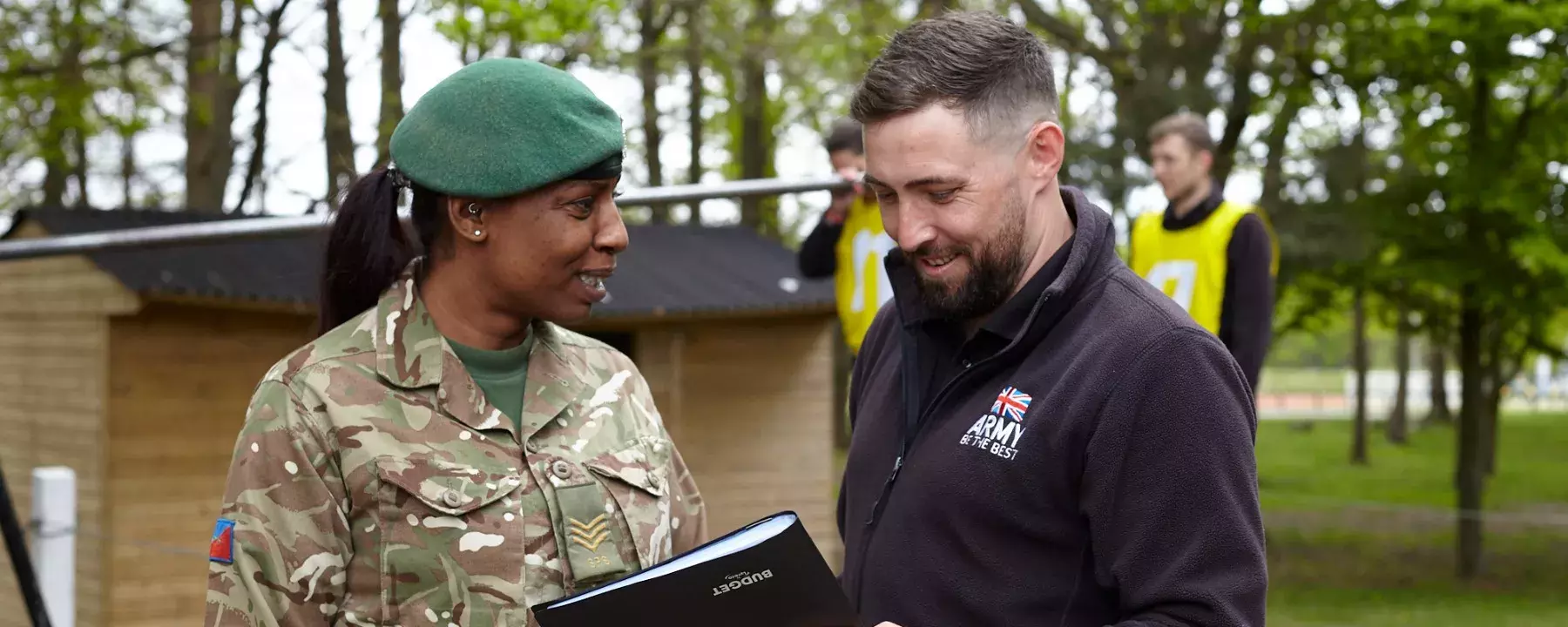We're dedicated to developing tomorrow's talent and creating a better future through the recruitment, training, and retention of the best people for our armed forces.
People are at the core of our defence services, which is why we understand that talent acquisition, training and management are central to building effective future-ready armed forces. As a long-standing partner of the defence sector, we ensure people are recruited into the British Army as well as fully trained in the Royal Navy and Royal Marines. We’re also a significant employer of veterans, whose contribution to our workforce is significant. Their experience gives us a greater understanding of how the armed forces look after their people before, during and after their careers.
Public and independent reviews
This year, there has been a strong focus on people in all three of the recent reports published about the armed forces. The Haythornthwaite Review examines the incentivisation of armed forces personnel as they work with their counterparts in the Army and Royal Navy to improve the lives of those serving our country. The Defence Command Paper (DCP23) also continues to highlight the significance of defence people and explores the future of the armed forces.
As a result of the Haythornthwaite Review, the Ministry of Defence (MoD) is taking forward three key recommendations, all of which relate to the work we’re doing:
- providing greater flexibility for serving personnel by increasing the fluidity of being able to move between the military, the Civil Service and industry.
- adopting a new employment model and skills framework, Total Reward Approach, to ensure a more competitive incentivisation package.
- improving the digitisation of people management systems to remove the red tape that currently prevents flexibility and workforce agility, working towards a single Armed Forces’ Act.
The implementation of these recommendations demonstrates the MoD’s commitment to improving its service to defence personnel. Combined with the additional £400m investment in accommodation over the next two years, these changes should improve recruitment into the armed forces and the satisfaction of families dedicated to protecting our country.
Defence procurement
Taking a different approach, the third report this year, “It is broke – and it’s time to fix it” from the Defence Committee focuses primarily on procurement. It does, however, discuss people, but from the perspective of Defence Equipment & Support (DE&S), which is currently facing retention issues. The report indicates that important skills such as contracting and commercial are in high demand and pay levels do not compare favourably with the private sector. Consequently, experienced and talented people are leaving DE&S to work in the private sector for higher salaries.
Skills fit for the future
It’s encouraging to see that the MoD is recognising the challenges facing our armed forces; understanding that requirements are becoming more technical and demanding, especially as artificial intelligence becomes more prevalent in our lives. Compared to 10 years ago, the skills that we require have vastly changed and continue to evolve. The need for cyber and intelligence skills is on the rise, and it is evident that industry offers more compelling career opportunities than the armed forces.
The Recruiting Partnership Project (RPP), a Capita partnership project which attracts, recruits and selects soldiers and officers, both Regular and Reserves, for the British Army, continues to be affected by this challenging recruitment environment. We see this from within the forces but more specifically from within industry, and the Haythornthwaite Review recognises this:
“The Armed Forces’ competitors for skills in the broader labour market are facing similar challenges.They are chasing the same, rapidly developing skills – and they often have more money to throw at the problem”.
However, it’s not just about skills. Young people have the opportunity to make a real difference to the security of their home and country by joining the army and other service forces – something the private sector cannot offer. But these opportunities are not always recognised or appreciated. Across the board, fewer people are joining the armed forces and more are leaving, and unless something is done differently, we are unlikely to see a change anytime soon.
As the make-up of the workforce evolves, we can’t always predict what skills will be needed in the future, but we can plan ahead. As part of its modernisation of training for the Royal Navy and Royal Marines, Project Selborne – the consortium led by Capita - is already driving the development of the necessary skills required for a future workforce, such as technology, artificial intelligence and cyber.
Diversifying recruitment
The armed forces need to focus on a broader talent pool; upskilling those already in the workforce and diversifying the requirements for recruitment. Armed forces recruiters, including Capita, will need to make the services more visible to the general public, promote the importance of science, technology, engineering and mathematics (STEM) and demonstrate what opportunities are available as career options to those still in education.
In addition, the new army recruitment campaign, being launched this autumn, will also be exploring how the recruitment process is evolving and highlighting some of the changing motivations that will encourage young people to consider a career in the armed forces.
Russia’s invasion of Ukraine
The war in Ukraine is defining the way the UK looks at defence, and this has been a theme across all the reviews. The DCP23 recognises the Ukrainian people’s unity in support of the war and how they have inspired people around the world. It also draws a connection to the UK Armed Forces and how they can utilise the learnings:
“This re‑emphasises the need to provide our people with the skills and support necessary to maximise their potential, to unshackle them from excessive process, and to strengthen the connection between the Defence enterprise and society, including through the Reserves: prevailing in war requires a national effort.”
The UK has played a significant role in supporting Ukraine and this includes people, not least in relation to training. Capita’s Project Selborne has trained over 100 Ukrainian naval officers and we’re proud of our small contribution to this important activity.
We’re committed to working with the armed forces to develop an end-to-end solution and support the challenge of attracting, recruiting, training and retaining the right personnel for the UK’s armed forces. We welcome the recent recommendations and recognise that some aspects will be more difficult to implement than others. Through our leading programmes, the Recruiting Partnership Project and Project Selborne, we’re proud to be playing a key role in the recruitment and development of armed forces personnel.

Richard Holroyd
CEO, Capita Public Services Division
Richard joined Capita in January 2021 as the Managing Director and Client Partner of the Defence, Learning, Fire and Security Sector, one of the largest strategic suppliers to the UK MOD. He led a team of over 5000 people who enable the UK Armed Forces globally to deliver better outcomes. Richard is now CEO for Capita Public Services Division.







